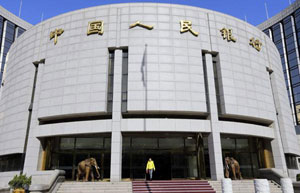The default of Zhejiang Xingrun Real Estate Co may portend difficult times ahead for small developers amid emerging risks in third- and fourth-tier cities, analysts said.
On Tuesday, several media reports said that Zhejiang Xingrun, a private property developer in Fenghua, Zhejiang province, is likely to default on 3.5 billion yuan ($573 million) in debt owed to several banks, as well as other obligations.
 |
But the central bank has denied that any such meeting took place.
"We believe this is merely one example of many distressed small developers in China," said Bei Fu, credit analyst with Standard & Poor's Financial Services LLC, adding that most of these companies own only one or few projects.
Chen Li, chief China strategist at UBS Securities Co Ltd, said there will be further defaults in the real estate sector for a variety of reasons: oversupply in smaller cities, significantly slower growth rates and weaker profit margins.
But Chen said defaults will be limited to smaller companies such as Zhejiang Xingrun.
Periods of oversupply aren't that unusual, though such conditions strain profitability and liquidity as inventories are reduced. But larger developers can lower their risks by diversifying into multiple markets, underscoring the importance of scale, according to Bei.
"So far, listed property developers' cash flows remain healthy, thanks to robust sales last year. Moreover, they have better access to capital than smaller developers," said Chen.
Large developers can obtain construction funding from banks at 6 percent to 9 percent. But smaller ones pay up to 20 percent, and they also grapple with limited availability of funds and refinancing risks. Most of them have turned to trust financing as an alternative to bank borrowing.
Trust financing is a form of asset securitization used by several industries in China. When developers raise money in this way, they package projects and use them as collateral for a bank loan. Banks sell units of these financing packages to institutional investors.
 |
 |
